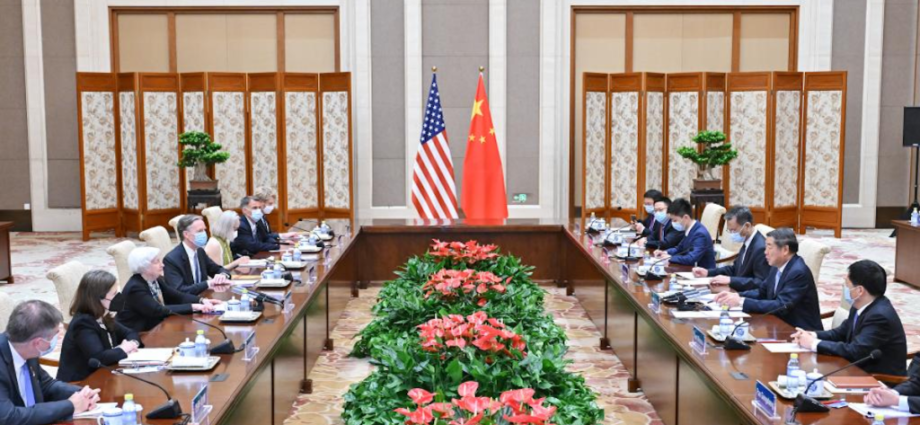Ahead of a summit in San Francisco next week, Beijing has urged Washington to take immediate actions to stop US decoupling from China, .
Yuyuan Tantian, a social media account of the China Central Television (CCTV), said in a commentary that the US has been trying to decouple from China in the name of “de-risking,” “friend-shoring” and “safeguarding national security.”
“Friend-shoring” refers to the United States’ strategy of encouraging its firms to place orders in like-minded countries so manufacturers will have an incentive to move from China to these places.
That’s an issue that the US side was expecting to come up. “The US has no desire to decouple from China,” US Treasury Secretary Janet Yellen said in an opening remark during a meeting with Chinese Vice Premier He Lifeng in San Francisco on Thursday.
“A full separation of our economies would be economically disastrous for both our countries, and for the world,” Yellen said. “We seek a healthy economic relationship with China that benefits both countries over time.”
“Beyond our bilateral economic relationship, I look forward to discussing our collaboration on global challenges, from climate change to debt distress in low-income countries and emerging markets,” she said. “As the world’s two largest economies, we have an obligation to lead on these and other issues, for the people in our countries and around the world.”
The Chinese commentary raised, besides decoupling/friendshoring, five additional concerns:
- the United States’s generalization of “national security” as a justification for changing the rules of commerce,
- chip export controls,
- allegedly unfair treatment of Chinese firms in the US,
- a “smear” campaign against China’s business environment and
- US criticism that China has set up “debt traps” in developing countries.
The social media account is seen as authoritative as it has access to China’s high-level diplomatic information, including the dialogue during a 90-minute phone call between Chinese President Xi Jinping and US President Joe Biden on September 10, 2021.
Vice-Premier He said his previous discussions with Yellen has been constructive so both sides will look into more economic and financial topics of China and the US. He said he hopes to use this chance to raise some issues that concerned China the most.
He did not disclose what issues he would raise in his meetings with Yellen on Thursday and Friday. The six concerns mentioned in Yuyuan Tantian’s article are apparently meant to reveal what He would have said if he had listed them.
Five demands vs six concerns
Back in July Yellen met with He during her four-day trip to China. After their meeting, the Chinese Finance Ministry said in a statement that the China side had made five demands to the US side.

It said Beijing was concerned by the extra tariffs, company sanctions, investment restrictions, export controls and Xinjiang product bans imposed by the US on China in recent years.
Yuyuan Tantian’s latest article, with the title “A new round of China-US dialogues begin,” elaborated these points and stretched them out into six concerns.
According to the self-description, the author of “Yuyuan Tantian” is a woman, an “experienced political and economic news reporter,” who has a PhD in Economics.
“Since the Biden administration took office, the terminology of China’s economic policy has been changing, from ‘decoupling’ to ‘recoupling’ to ‘competition,’ from small yard, high fence’ to’ ‘de-risking’ to ‘friend-shoring,’” she said in the article. “No matter how, they still refer to the so-called security issues.”
She added: “In its economic exchanges with China, the US has long generalized and abused the term ‘national security.’ Behind this, the United States’s hegemonic thinking is still at work.”
She said that the “friend-shoring” strategy, which is no different from “decoupling,” allowed China to ship more solar panels to Southeast Asia and auto parts to Mexico in recent years.
“The US wanted to exclude China from the global industrial and supply chain system. But its actions helped deepen the relationship between China and other countries,” she wrote.
On October 17, the US Department of Commerce banned Nvidia from shipping its A800 and H800 graphic chips, which can be used to develop artificial intelligence, to China. China’s orders involving US$5 billion of Nvidia chips have then been canceled.
Yuyuan Tantian saidd the US government not only failed to protect its own companies’ interests in China but also used untransparent and unfair administrative means to restrict Chinese firms from raising funds and operating in the US.
“The US side has so far added 1,300 Chinese firms to its entity list,” she said. “If it wants to work with China, it must trim this list.”
She added that it was wrong for US Commerce Secretary Gina Raimondo to have said in August that China is “uninvestable.” She said China will continue to open up its economy while American firms must grab the opportunity to invest in it.
She also criticized the US and its allies for promoting the narrative that China’s overseas investments created “debt traps” for developing countries.
It’s official
After Yellen reiterated on Thursday that the US won’t decouple from China, Foreign Ministry Spokesperson Hua Chunying officially announced on Friday that Xi will be in San Francisco from November 14 to 17 for a China-US summit meeting and the 30th APEC Economic Leaders’ Meeting.
The Xi-Biden meeting is expected to be held on November 15, Kyodo News reported on Wednesday.
Read: Luring investment a high priority for Xi’s US trip
Follow Jeff Pao on Twitter at @jeffpao3

